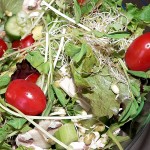
The following article is by my dear friend Denise Holden. I’ve been meaning to post about sprouts for a while now, as they are a prominent part of my diet. They’re such a great way to eat fresh, live, nutrient rich food. Here’s what Denise has to say about them:
———————————————————–
During the winter season, sprouts are an excellent source of fresh vegetables.
Sprouts represent the point of greatest vitality in the life cycle of a plant. During sprouting, vitamin and enzyme content increases dramatically. The sprouting process predigests the nutrients of the seed, making it easier to assimilate and metabolize: starches are converted into simple sugars, proteins into free amino acids, and fats into free fatty acids. This explains why grains and legumes, many of which are common allergens, often do not cause allergies when sprouted.
Alfalfa sprouts are diuretic, will benefit the urinary and intestinal systems, and will help to detoxify the body. One compound in particular called sulforaphane in broccoli sprouts has been shown to improve the liver’s ability to detoxify carcinogens and other toxic compounds.
Sprouts will not enjoy sprouting as much in tap water, making a cleaner water source (like bottled spring water or filtered water) a better choice when sprouting.
Quick serving ideas
- Sprouts make great replacements for lettuce on sandwiches
- Sprinkle tossed green salads with a mix of alfalfa and broccoli sprouts
- Make a healthy burrito by adding a handful of sprouts
One word of caution about alfalfa: this seed has higher than usual amounts of an amino acid called canavanine, which has been associated with worsening of inflammatory conditions including rheumatoid arthritis and systemic lupus erythematosus. Individuals with chronic inflammatory conditions, including autoimmune conditions, may want to avoid alfalfa sprouts for this reason.
HOW TO SPROUT ***** From Healing with Whole Foods, by Paul Pitchford.
All measurements below yield one quart of ready sprouts
Seed Soak Time Days to Sprout
2 Tbsp alfalfa or red clover 6 hours 5-6 days
1/4 cup radish or mustard 6 hours 5-6 days
1/2 cup lentils or fenugreek 8 hours 3 days
1/2 cup mung bean 8 hours 3-5 days
1 cup wheat or rye 12 hours 3 days
1 cup aduki, chick peas, soy, or other legumes or grains 12 hours 3-5 days
2 cups sunflower seeds 12 hours 2 days
1- Cover the mouth of the jar with stainless steel sprouting screen or cheesecloth, which is tied on or secured with a rubber band. After soaking seeds (use distilled or spring water), drain well and keep in warm dark place – sprouting time increases with more light and cooler conditions
2- Rinse twice a day, ideally morning and evening. An exception is soy, which may rot if not rinsed 4 times daily. Keep jar tilted mouth down for better drainage – thorough rinsing and complete draining improve sprout flavor. You can save all rinse water for cooking, animals, or plants.
3- After 3 days place alfalfa, red clover, radish, and mustard sprouts in a cool place with indirect sunlight to induce chlorophyll. Continue rinsing twice daily until sprouts are ready.
4- During the sprouting process, the hulls on certain seeds slough off. It is important to remove hulls from alfalfa and radish sprouts since these easily rot. To remove the hulls, place the sprouts in a large bowl of water and agitate them, further loosening and brushing them aside. Gently reach under the sprouts and lift them out of the water, without disturbing the sunken hulls.
5- Drain sprouts well. If refrigerated, they keep up to one week in a plastic bag or covered glass jar.
(Another great source is The Sprouting Book by Ann Wigmore)
